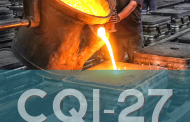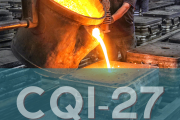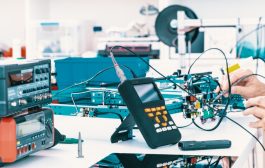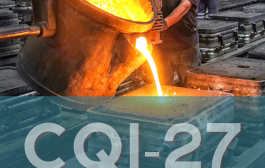
özel proses – special process – özel proses nedir – kaynak- ısıl işlem – kaplama
Otomotivde, raylı sistemlerde ve havacılık sektöründe sıkça kullanılan özel proses tanımı ve yönetimi ile ilgili sizleri bilgilendirmek istedik.
Özel Proses nedir?
Otomotivde, raylı sistemlerde ve havacılık sektöründe sıkça kullanılan özel proses tanımı ve yönetimi ile ilgili sizleri bilgilendirmek istedik.
Özel proses:
Üretim ve bakım proseslerinde ürünün özelliklerini deforme etmeden anlayamayacağımız özellikler kazandırdığımız, analizi maliyetli ve zaman alan proseslere “özel proses” olarak adlandırıyoruz. Problem var mı yok mu tespiti uzun sürüyor, ürün incelerken deforme olabiliyor ve maliyetli bir işlem, o halde, üretim prosesi esnasında tedbirleri alalım, gereklilikleri tam olarak yerine getirelim. Bu proseslere, “Özel Proses” diyelim ve özel ilgi gösterelim.
Ürünün özelliğini anlamak için test gerçekleştirdiğimizde ürün tekrar kullanılamıyor ise, yaptığımız testi aynı üründe aynı noktada tekrarlayamıyor isek bu özelliği kazandıran proses özel proses oluyor.
Bu testler maliyetlidir ve zaman alır. Özellikle seri üretim koşullarını düşündüğünüzde bu prosesleri tasarlamak, yönetmek ve izlemek oldukça önem taşır.
Bu nedenle bu proseslere özel bir yeri olduğu için, özel ilgi istediği için “özel prosesler” demişler. Özel prosesin gerçekleştiği ortam, makine, ölçüm cihazı (yönetim, izleme), malzeme, metot ve operatör yine özel olarak seçilir ve yönetilir. (6M analizi, bkz. proses yeterliliği)
Special process: A process used in manufacturing, construction of infrastructure or maintenance where the conformity of the resulting product cannot be readily, technically or economically determined without destructive analysis prior to use is referred to as a “Special Process”. NOTE Accordingto ISO 9000:2015, “a process where the conformity of the resulting output cannot be readily or economically validated is frequently referred to as a “special process”.
Bu proseslere örnek olarak, döküm, dövme, torklama, kaynak, kumlama, ısıl işlem gibi prosesleri sayabiliriz. Örneğin döküm prosesinde ürünün tane yapısını anlamak, kimyasal komposizyonunu tayin etmek için ürünü belirli bir derinlikten kesmeniz, hazırlamanız ve analiz gerçekleştirmeniz gerekiyor. Spektral analiz ile test eetiğinizde aynı üründe aynı noktada başka bir test gerçekleştiremeyip, sonuçların bizi yanıltmaması için hemen yanından farklı bir noktadan testi gerçekleştiririz. Fakat, o test o parça o nokta artık tekrar edilemez.

Karşınızda NQS Net Quality Firmasının Kalibrasyon Eğitim ve Denetim Ekibi
Special process: A process used in manufacturing, construction of infrastructure or maintenance where the conformity of the resulting product cannot be readily, technically or economically determined without destructive analysis prior to use is referred to as a “Special Process”. NOTE Accordingto ISO 9000:2015, “a process where the conformity of the resulting output cannot be readily or economically validated is frequently referred to as a “special process”.
Criticality level of the output In special processes the following six input elements (6M) need to be rigorously managed to achieve a consistent output: • Management, • Manpower, • Machines, • Methods, • Materials, • Mother nature (Environment). Process input elements and output can be represented using an Ishikawa diagram. These diagrams are causal diagramsthat show the potential causesresulting in a specific event.
Operating method The management of the special process is key to the output and is therefore described in detail before the other 5M input elements: Manpower, Machine, Methods, Material and Mother nature.
IATF 16949 Sistem Danışmanlığı / IRIS 22163 Sistem Danışmanlığı / Otomotiv Danışmanlığı / Core Tools Eğitimleri / Raylı Sistemler Danışmanlığı

Firmanıza özel Core Tools eğitimleri – CQI Özel Proses Eğitimleri CQI8 – CQI9 – CQI11 – CQI12 – CQI15 – CQI17 – CQI18 – CQI23 – CQI27 – CQI30 ve VDA6.3 ve VDA6.5 Eğitimleri vermekteyiz.
Aşağıdaki CQI Eğitimleri için bizimle temasa geçebilirsiniz.
CQI5 Business Operating Systems 1999 1 Gün
CQI8 Layered Process Audit Eğitimi 1 Gün
CQI9 Isıl İşlem Prosesi Değerlendirme Eğitimi 2 Gün
CQI10 Problem Çözme 1 Gün
CQI11 Metalik Kaplama Prosesi Değerlendirme Eğitimi 2 Gün
CQI12 Metalik Olmayan Yüzey Kaplama Prosesi Değ. Eğitimi 2 Gün
CQI14 Otomotiv Garanti Yönetimi Eğitimi 1 Gün
CQI15 Kaynak Prosesi Değerlendirme Eğitimi 2 Gün
CQI17 Lehimleme Özel proses Değerlendirme Eğitimi <450C 1 Gün
CQI18 Effective Error Proofing V1 1 Gün
CQI19 Alt Tedarikçi Yönetim Eğitimi 1 Gün
CQI21 Etkili Problem Çözme Teknikleri Eğitimi 1 Gün
CQI22 Kalitesizlik Maliyetleri Yönetimi Eğitimi 1 Gün
CQI23 Kalıplama Sistem Değerlendirmesi Eğitimi 1 Gün
CQI24 Hata bazlı dizayn gözden geçirme Eğitimi 1 Gün
CQI25 SPC Hızlı Başlangıç Eğitimi 1 Gün
CQI26 SPC Kısa Proses Üretim Yönetimi Eğitimi 1 Gün
CQI27 Döküm Prosesi Değerlendirme Eğitimi 2 Gün
CQI28 İzlenebilirlik Yönetimi Eğitimi 1 Gün
CQI29 Brazing Prosesi Değerlendirme Eğitimi > 450C 1 Gün
CQI30 Kauçuk Kalıplama Prosesi Değerlendirme Eğitimi 2 Gün

cqi15-kaynak proses denetimi eğitimi – cqi15-welding-process-audit-evaluation-training-4
Özel süreçlerin yönetimi, Özel süreç yönetimi şunları içerir: • özel süreç yönetimindeki rol ve sorumluluklar, • risk yönetimi, • süreç yeterliliği, • işlem doğrulama, • proses kontrolü ve izleme (göstergeler), • uygunsuzluk yönetimi, • değişim yönetimi, • transfer yönetimi, • Tedarik zinciri yönetimi, • özel süreç denetimleri/denetimleri, • bilgi Yönetimi, • harici sağlayıcılar tarafından gerçekleştirilen özel işlemler.
Özel süreç yönetimindeki roller ve sorumluluklar Organizasyon içinde, özel süreçleri yönetmek için roller ve sorumluluklar tanımlanmalıdır. Kuruluş, özel bir süreç koordinatörü belirlemeli ve bu atama kuruluşa iletilir. Özel süreç koordinatörü dışarıdan (taşeron) ise, bir atamaya iç vekil de dahil edilmelidir.Not – Koordinatörün belirtildiği kılavuzun geri kalanında faaliyet, ilgili kuruluş tarafından yürütülebilir. koordinatör yardımcısı. Özel süreç koordinatörü ile organizasyon arasındaki ilişki tanımlanmalıdır. ve iletişim kurdu. Özel süreç koordinatörü, organizasyona izin verecek şekilde entegre edilmelidir. sorumluluk alanlarındaki görevlerin herhangi bir kısıtlama olmaksızın yerine getirilmesi; koordinatör olmalı üretimden bağımsız olarak gerekli talimat verme ve karar verme yetkisine sahiptir. Organizasyon içindeki özel süreç koordinatörünün sorumluluk alanları belirlenmelidir. belgelendi. Bu sorumluluk alanları şunları içerebilir: • dahili yönergeler, spesifikasyonlar, prosedürler ve talimatlar, • ihale yönetiminde gereksinim incelemesi ve fizibilite teyidi, • tasarım inceleme aşamasında özel süreç içeriğinin/öğelerinin doğrulanması (varsa), • malzeme özellikleri (taban ve sarf malzemeleri dahil), • Tedarik zinciri yönetimi, • özel süreçlerin harici sağlayıcıları, • muayene/test dahil ekipman ve araçlar, • personelin kalifikasyonu, • özellikle yeni ürünler için üretim planlaması ve devreye alma, • denetim planlaması, • süreç kalifikasyonu ve doğrulaması, • süreç ve ürün denetimleri, • uygunsuzluklar ve düzeltici aksiyonlar, • tanımlama ve izlenebilirlik, • Kalite kayıtları, • bilgi Yönetimi. Özel süreç koordinatörünün özel süreçte uygunsuzluk yönetimine dahil olması gerekir. Gerekli katılım derecesi belgelenmeli ve uygunsuzluğun ciddiyeti (örn. yeniden işleme, onarım, reddetme vb.), ürün kritikliği ve sözleşme gereklilikleri dikkate alınmalıdır. Yeniden kalifikasyon, doğrulama ve izlenebilirlik gereksinimleri tanımlanmalıdır. Dış sağlayıcılar tarafından gerçekleştirilen özel işlemler Özel süreçleri yürüten dış sağlayıcılar olması durumunda, kuruluş, gerektiğinde, kuruluş veya müşteri tarafından özel işlemin onaylanması da dahil olmak üzere, ürün ve süreçle ilgili tüm gerekli şartları iletmelidir.
Koordinatör yeterliliği Uluslararası veya ulusal özel süreç standartlarından herhangi bir gereklilik yoksa, kuruluş asgari akademik ve profesyonel ön koşulları belgelemelidir. Bu ön koşullar, özel süreç koordinatörünün madde 5.1.1’de açıklanan rol ve sorumlulukları yerine getirebilmesini sağlamalıdır. Koordinatör, özel süreçte bir “uzman” olmalıdır: eğitim veya deneyimden elde edilen özel beceri veya bilgiye sahip bir kişi. Özel süreç koordinatörü, örneğin sergilere, kıyaslamalara, çalıştaylara, mesleki eğitimlere, teknik toplantılara ve konferanslara vb. katılarak özel süreçteki bilgilerini sürekli olarak yenilemelidir. Kanıtlar belgelenmelidir. Bu gereksinimler iç ve dış koordinatörler için geçerlidir.
İş Süreçleri Yönetim Sistemi (BPMS) – Operatör kalifikasyonu Operatör kalifikasyonu, her özel proses için minimum bir gerekliliktir. Gerekli sayıda kalifiye operatör, işin türü, üretim kapasitesi ve programı (en az iki kalifiye operatör) dikkate alınarak kuruluş tarafından tanımlanmalıdır. Yeterlilik, ilgili ulusal/uluslararası özel proses standardı ve sözleşmesinde belirlenen gereklilikleri karşılamalıdır. Böyle bir standart yoksa, özel süreç koordinatörü yeterlilik prosedürünü ve kriterleri tanımlar Kuruluş, özel süreç koordinatörü tarafından tanımlanan ve bir operatörün nasıl nitelendirileceğini açıklayan bir operatör yeterlilik prosedürü yayınlamalıdır. Bu belge şunları içermelidir: • gerekli yeterlilik belgeleri (örn. uygulanabilir özel süreç talimatı, değerlendirme sayfası, yeterlilik kaydı),
Management The management of the special process influences all of the input elements (see Fig. 1) as well as the output. Special process management encompasses: • roles and responsibilities in special process management, • risk management, • process qualification, • process validation, • process control and monitoring (indicators), • nonconformity management, • change management, • transfer management, • supply chain management, • special process audits/inspections, • knowledge management, • special processes performed by external providers.
Roles and responsibilities in special process management Within the organization, roles and responsibilities for managing special processes should be defined. The organization should designate a special process coordinator and this designation should be communicated to the organization. If the special process coordinator is external (subcontracted), an internal deputy should also be included to the designation. NOTE In the rest of the guideline where coordinator is mentioned, the activity may be carried out by the coordinator’s deputy. The relationship between the special process coordinator and the organization should be defined and communicated. The special process coordinator should be integrated into the organization in a way that allows the execution of the tasks in the areas of responsibility without any restrictions; the coordinator should have the required authority to instruct and make decisions, independent from production. The areas of responsibility of the special process coordinator within the organization should be documented. These areas of responsibility may include: • internal guidelines, specifications, procedures and instructions, • requirement review and feasibility confirmation in tender management, • validation of special processes content/items in design review phase (if applicable), • material specifications (including base and consumables materials), • supply chain management, • external providers of special processes, • equipment and tools, including inspection/testing, • qualification of personnel, • production planning and start up, especially for new products, • inspection planning, • process qualification and validation, • process and product audits, • non conformities and corrective actions, • identification and traceability, • quality records, • knowledge management.

Nonconformity management The special process coordinator needs to be involved in nonconformity management in the special process. The degree of involvement required should be documented and take into account the severity of the nonconformity (e.g. rework, repair, reject, etc.), product criticality and contract requirements. Re-qualification, validation and traceability requirements should be defined.
Special processes performed by External providers In case external providers that carry out special processes, the organization should communicate all the necessary requirements related to the product and the process including, when required, the approval of the special process by the organization or by the customer.
Coordinator qualification If there are no requirements from international or national special process standards, the organization should document the minimum academic and professional pre-requisites. These prerequisites should ensure that the special process coordinator is able to fulfill the roles and responsibilities described in clause 5.1.1. The coordinator should be an “expert” in the special process: a person with special skill or knowledge derived from training or experience. The special process coordinator should continuously renew his/her knowledge in the special process, for example by participating in exhibitions, benchmarking, workshops, professional training, technical meetings and conferences, etc. Evidence should be documented. These requirements apply for internal and external coordinators.

Operator qualification Operator qualification is a minimum requirement for every special process. The required number of qualified operators should be defined by the organization, considering the type of work, production capacity and schedule (minimum two qualified operators). Qualification should fulfill the requirements established in the relevant national/international special process standard and contract. If such standard does not exist, the special process coordinator defines the qualification procedure and criteria (see clause 5.1.1 for the roles and responsibilities for special process coordinator). The organization should issue an operator qualification procedure, defined by the special process coordinator, which describes how to qualify an operator. This document should include: • required qualification documents (e.g. applicable special process instruction, evaluation sheet, qualification record), • relevant standards (if applicable), • identification and storage of test pieces and test records, including operator traceability (if relevant), • inspection method and acceptability criteria (if relevant), • range of validity of the qualification, • qualification renewal criteria.
A standard qualification record form should be established by the organization. If a standard qualification form exists, for example, in international or national standards, that form may be used directly. Qualification tests are supervised by the special process coordinator. Qualification approval should be given by the special process coordinator or by an external accredited examination body, if applicable. The same requirements apply for internal and external personnel.

Operator skill matrix The special process skill matrix should include all relevant special processes operators. The matrix criteria should include: • academic qualification, • professional experience, • participation in coaching and training programs, • manual dexterity, • process or task assessment level. This matrix should reflect the minimum requirements for a given task or workstation as well as other criteria considered relevant by the organization
Machines The input element “Machines” refers to all equipment and tools that affect the special process. The equipment and tools that are required to perform the special processes should be qualified according to clause 5.1.3 and regularly maintained (corrective, preventive and predictive maintenance) to ensure the same performance. Calibration and/or verification requirements should be considered when defining equipment and tools in order to ensure a consistent special process output with the expected quality level. Handling, capacity, ergonomic and HSE aspects should be considered during validation. A capability analysis is recommended to ensure that the equipment and tools can deliver the parameters that are required by the process, in a reproducible and repeatable manner. Equipment and tools that are critical to the special process output should be traceable, so that affected products can be identified in case of nonconformity. Special process operators should be trained (e.g. user manual) to use the relevant equipment and tools.
Methods The input element “Methods” refers to how the special process is performed: • specification of relevant 4M (Manpower, Machine, Material and Mother nature), • sequence of operations, • parameters, The methods used in the special process should be qualified according to clause 5.1.3 and documented. The methods should be revised and maintained as necessary. Parameters that may be considered are: • distance, • energy (current, voltage, method of transfer, arc length), • flow rate, • pressure or force, • position (operator, machine, tooling, workpiece, etc.), • quantity (weight/volume), • rate or speed, • temperature, • time, • torque, • etc. A suitable range of parameters should be established. Means should be provided to control the parameters within the established range and ensure the proper execution of the instructions. The method should also describe, when necessary: • material preparation, • cleaning (initial, intermediate and final), • execution sequence, • inspections (initial, intermediate and final) and/or hold points, • preservation, • etc. Parameters and/or instructions that are critical (see clause 5.1.2) to the special process output should be traceable, so that affected products can be identified in case of nonconformity.
Materials The input element “Materials” refers to the materials that go into the product (base materials) and auxiliary materials (consumables). The materials used in the special process should be qualified. The materials should also: • fulfil the applicable regulations and laws (e.g. REACH, RoHS, etc.), • fulfil the applicable technical specifications and standards, • fulfil the requirements defined in the organization’s special process documentation, Materials that are critical (see clause 5.1.2) to the special process output should also be traceable, so that affected products can be identified in case of nonconformity.
Mother nature (Environment) The input element “Mother nature” refers to the environmental conditions of the workstation where the special process is carried out. The specific environmental conditions that affect the output of the special process should be qualified according to clause 5.1.3. Conditions that may be considered are: • air currents, • air quality, • cleanliness, • contamination sources, • electrostatic discharge, • humidity, • illumination, • magnetic fields, • noise, • radiation, • temperature and temperature gradients, • vibration, • etc. A suitable operational range should be established for the entire special process (before, during and after execution). Means should be provided to control the environmental conditions within the established range based on risk assessment. Environmental conditions that are critical (see clause 5.1.2) to the special process output should be traceable, so that affected products can be identified in case of nonconformity. IRIS Guideline 6: SPECIAL PROCESSES
International Railway Industry Standard (IRIS)
Coating | CQI-12
www.kahverengi.online IATF 16949 Sistem Danışmanlığı / IRIS 22163 Sistem Danışmanlığı / Otomotiv Danışmanlığı / Core Tools Eğitimleri / Raylı Sistemler Danışmanlığı






































